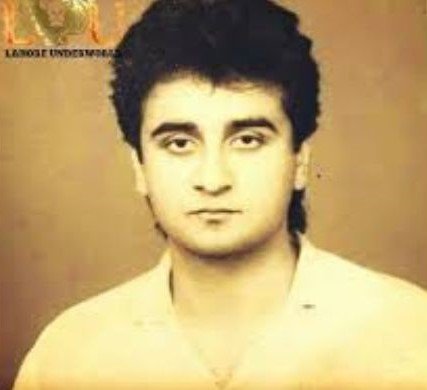Mazhar Tibbi was once one of Lahore’s most well-known underworld figures. Yet, his story did not begin in crime. Born into a respected and educated family, he came from comfort and privilege. His father was a reputed engineer, and his family owned large properties across southern Punjab, including areas in Dera Ghazi Khan, Muzaffargarh, Layyah, and Bhakkar.
The family lived in Garden Town, Lahore, in a spacious home spread across four kanals. Tibbi and his brothers, Azhar and Shakeel, studied at Divisional Public School (DPS) and later at FC College. In his youth, he was known not for crime but for charm and confidence.
People described him as handsome, fashionable, and social. He loved cars, fine clothes, and the attention that came easily to him. His reputation grew quickly, not because of violence, but because of his lifestyle and his relationships with people from influential families.
How a Student Turned Into a Gangster
Mazhar Tibbi’s early life showed little sign of what he would become. Friends remember him as confident, bold, and ambitious. His involvement with student politics and the Black Eagles gang marked the beginning of his descent into the world of crime.
In the mid-1980s, Lahore was experiencing a rise in organized student groups that often blurred the line between politics and violence. Tibbi, surrounded by influence and power, became drawn to control and authority.
His first encounter with law enforcement came in 1986 when he was named as a suspect in the murder of a lawyer’s sister, a case that made headlines at the time. Though he was later granted bail, his brief stay in jail brought him into contact with hardened criminals who saw his potential and charisma as valuable assets.
That brief imprisonment changed the course of his life.
Revenge and the Turning Point
The event that pushed Tibbi fully into the underworld came after a deeply personal incident. According to reports, during a police search, his mother was allegedly mistreated and burned on her arm with a heated iron rod by a sub-inspector named Ikram Hameed.
After learning what had happened, Tibbi reportedly vowed revenge. Disguising himself and posing as a senior official, he lured the officer into a meeting and kidnapped him. The officer was later found dead, marking Tibbi’s first violent act.
This incident established his reputation as someone who would go to any extent for revenge and respect. From that point onward, he was seen not just as a man of influence but as a gangster capable of brutal retaliation.
Rise to Power in Lahore’s Underworld
Over time, Tibbi’s influence in Lahore grew. Police sources described him as well-connected, with ties to political families and powerful landlords. He had access to modern weapons that even the police lacked at the time, including rocket launchers and automatic rifles.
Despite being wanted in several cases, Tibbi often moved freely across the city. He drove luxury cars, frequented elite areas, and was rumored to have relationships with individuals from influential families.
In the public eye, he became a mix of fear and fascination. To his supporters, he was bold and fearless. To law enforcement, he was a serious threat.
Even during his multiple imprisonments, his status remained untouched. In jail, he was treated with respect and was reportedly given special privileges, including choosing his own barrack. He continued to operate from within the prison, maintaining influence over officers and inmates alike.
Also read: Balaj Tipu murder case: Gangster Gogi Butt’s name added to list barring foreign travel
Political Connections and Influence
Mazhar Tibbi’s name was often linked with powerful figures of the time. It was said that his release from jail on several occasions came through recommendations from influential politicians, landlords, and even the Governor’s office.
His connections gave him both protection and access. For some, he was a useful political tool. For others, he was a problem too deeply rooted in the system to confront directly.
Many within law enforcement reportedly avoided taking credit for operations against him, fearing retaliation. Reporters were sometimes instructed not to name officers involved in anti-Tibbi raids for their own safety.
The Final Chapter of Mazhar Tibbi
By the late 1990s, Mazhar Tibbi had dominated Lahore’s criminal scene for over a decade. But his growing influence eventually made him a target. In 1997, he was killed in what police described as an encounter.
Eyewitnesses and reports from that time suggested the incident was violent and one-sided, involving heavy gunfire and multiple officers. Some questioned the authenticity of the encounter, suspecting it was planned.
His death left behind many questions. Why was he given special treatment in jail? Who protected him for so long? And why did those same powers ultimately withdraw their support?
Legacy and Reflection
Mazhar Tibbi’s story reflects the intersection of power, privilege, and corruption. His life raises important questions about how the system treats influence, and how easily someone with wealth and connections can cross from privilege into violence.
He ruled Lahore’s underworld for over a decade, but his story ended as many do in the world of organized crime — with betrayal, bullets, and unanswered questions.
Even today, his name is remembered in Lahore’s old neighborhoods, not only for his crimes but also for how the system around him enabled his rise.
As one former officer remarked years later, “When institutions bend for power, more Mazhar Tibbis are born.”
